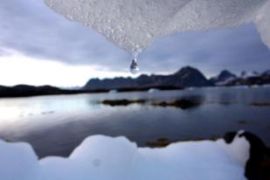US emissions ‘breach human rights’
Canadian Inuit petition asks for climate change relief in face of US carbon output.

Sheila Watt-Cloutier, an Inuit activist, said climate change is “destroying the right [of the Inuit] to life, health property and means of subsistence”.
| “Average Arctic temperatures increased at almost twice the global average rate in the past 100 years” A UN report on global warming |
“States that do not recognise these impacts and take action violate our human rights,” she said.
She said ice formations are much more likely to detach from land as temperatures rise, taking unsuspecting Inuit hunters out to sea.
The presentation of the Inuit petition comes as more than 60 nations launch the broadest scientific investigation yet of the Arctic and Antarctic to chart polar regions.
Many scientists say that warming of the Arctic, where indigenous hunting cultures and animals are under threat from receding ice, may be a portent of damaging shifts elsewhere on the planet linked to climate change.
Continued melting of ice sheets on Greenland or Antarctica in the next few decades risks raising world sea levels, threatening cities from Tokyo to New York and low-lying coral atolls in the Pacific.
“These regions are highly vulnerable to rising temperatures,” Michel Jarraud, head of the UN’s World Meteorological Organisation, said in a statement.
He said more monitoring stations were needed in polar regions.
Rising temperatures
| Your Views |
|
“As individuals we can contribute to the problem or solution”
Angmo86,Kutztown, US |
Arctic temperatures are rising fast partly because water or ground, once exposed, soak up far more heat from the sun than ice or snow.
Antarctica is staying cooler, with its far bigger volume of ice acting as a deep freeze.
The world’s top climate scientists said in a UN report last month that “average Arctic temperatures increased at almost twice the global average rate in the past 100 years”.
They projected that sea levels could rise by 18 to 59cm by 2100, by when Arctic sea ice may disappear in summers.
Nordic nations with Arctic territories fear industries such as tourism are vulnerable to climate change.